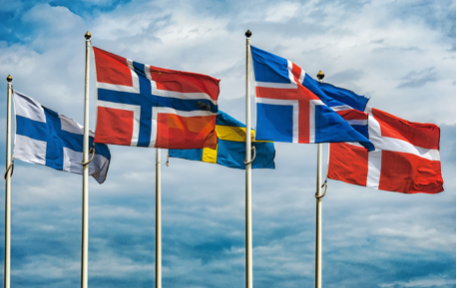In a news story on the Norwegian government website published on June 7, 2020, the release of a new report on Nordic cooperation was announced.
Last week the Nordic Foreign Ministers received the report “Nordic Foreign and Security Policy 2020: Climate Change, Hybrid & Cyber Threats and Challenges”.
On 30 October 2019, the foreign ministers of Denmark, Finland, Iceland, Norway and Sweden decided to task Mr. Björn Bjarnason of Iceland to prepare an independent report with non-binding proposals on how to further develop Nordic cooperation on foreign and security policy. This tasking marked ten years since Mr Thorvald Stoltenberg of Norway drafted a similar report presenting a range of recommendations of which a large share have already been implemented.
In the mandate, delivered to Mr. Bjarnason on 2 December 2019, he was requested to specifically focus on the scope for cooperation in addressing global climate change, addressing hybrid threats and cyber issues, and strengthening and reforming multilateralism and the rule-based international order. The mandate moreover stipulated that the report and the proposals should be ready by mid-year 2020. In his work he enjoyed the support of a reference group of experts and analysts from each of the five Nordic countries.
The Nordic Foreign Ministers express their appreciation to Mr. Bjarnason for his important work and look forward to studying the report’s recommendations. They will formally discuss the concrete proposals at their meeting in Copenhagen in September during Denmark’s presidency of the N5 cooperation.
The report can be read below but one of the more interesting sections is on cyber and hybrid threats.
Part of that section reads as follows:
Hybrid threats, including cyber-attacks and disinformation/influence operations, pose a serious and increasing challenge to the Nordic countries. By taking advantage of the vulnerabilities of democratic and open societies, hybrid threat actors undermine Nordic security, prosperity, and values.
Hybrid threats are ambiguous and designed to allow deniability. Therefore, it is difficult, but even more important, to address them. In all the capitals, interlocutors emphasized that the Nordics could meet these challenges more effectively together
While countering cyber-attacks and other hybrid threats is first and foremost a national responsibility, the Nordic countries must work closer together to keep up with ever more determined and sophisticated adversaries. Without duplicating existing structures and means of cooperation, such as NORDEFCO, there is potential for strengthened Nordic cooperation on several aspects of hybrid threats and cyber issues.
The importance of multilateral cooperation of like-minded states in fighting cyber and hybrid threats is undisputed.
All Nordic countries recognize the importance of The European Centre of Excellence for Countering Hybrid Threats (Hybrid CoE) in Helsinki, which supports participating states’ individual and collective efforts to enhance their capabilities, resilience, and preparedness to counter hybrid threats. Hybrid CoE is a bridge between the EU and
NATO. The Nordics, except for Iceland, are active members of the Centre. The Nordics equally recognize the importance of the work of the EU STRATCOM.
There are three key terms often used in connection with hybrid threats: situational awareness, resilience, and deterrence. Going beyond this, developing countermeasures against aggression, is increasingly needed.
Cyber has been described as an abstract realm with its high-speed communication lines, data collections and processing capabilities. The results of these virtual world processes are felt when they hit the real world. Hybrid warfare happens in the real and the virtual world.
The real-world’s segment is in principle well observed and understood, while the virtual segment operates stealthily in the invisible world of computers and networks until it shows effects in the real world.
State and non-state actors deploy hybrid means to challenge countries and institutions that they see as a threats, opponents or competitors to their interests and goals.
The range of methods and activities is wide, including: espionage; influencing information; meddling in elections; intellectual property theft; exploiting logistical weaknesses like energy supply pipelines; economic and trade-related blackmail; undermining international institutions by rendering rules ineffective; terrorism or increasing the sense of insecurity; threatening civilian air traffic, maritime communications, energy cables and causing maritime incidents.
Strong arguments have pointed out that one should actually not talk about “hybrid threats” but rather “hybrid warfare” as at least some Nordic countries are under constant attack.
It is of utmost importance to share experiences, not only to learn from one another but also to better realize whether there is a pattern to irregularities that might be part of a larger, strategic hybrid action directed against some or all of the Nordic countries. Being up to speed when it comes to tactical and technological trends in the field is crucial.
While attribution is a national responsibility, multinational solidarity is a vital part of hybrid and cyber deterrence. The Nordic countries should join hands in condemning those conducting hybrid warfare where part of the game is to deny any culpability.
The two state actors most often mentioned as posing a threat to the Nordics in this regard are Russia and China.
These states have developed effective subversive means that go much further in weakening their targets than fake news and disinformation do. Such means have been used before to prepare the ground for illegal annexation, as seen in the Crimea
in the spring of 2014.
That event represented a swift culmination of prolonged Russian efforts to destabilise Ukraine. Russia’s denial of any responsibility characterised the aftermath. Apart from the illegal incursion in the South China Sea, China conducts lower key hybrid operations than Russia.
Social engineering and economic espionage are Chinese trademarks having social, economic, and financial aims, mirrored in their efforts to gain access through strategic investments and research projects.
It is important to conduct foreign investment screening with special emphasis on security, i.a. in 5G systems and critical infrastructure.
The leading role of Nordic companies like Ericsson and Nokia in this field is often highlighted as important for ensuring a high-tech competition edge
nordicreport_2020And an e-book version can be read below:
p;


